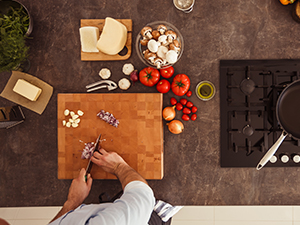What Is the Hardest Stone Countertop Material?
What is the hardest stone countertop material? This is a common question clients who are investing in countertops ask, because harder stones require less maintenance than softer stones. Read on to find out how stone hardness is measured, which stones are the hardest, and how to avoid damage that can happen regardless of hardness.
Mohs Scale
The simplest way to know the hardness of a countertop material is to reference the Mohs Scale, a scale of measurement that classifies mineral hardness and scratch resistance. This scale, which is rated from 1 to 10, with 10 being the hardest, determines what mineral is hard enough to cut or scratch softer materials. The ten minerals in the scale, from softest to hardest, are: talc, gypsum, calcite, fluorite, apatite, feldspar, quartz, topaz, corundum and diamond.
Hardness of Stone Countertop Materials
The hardness of a stone countertop can vary from one slab to the next, depending on its mineral content. For example, a slab of marble with high calcite content might be a 3 on the Mohs Scale, but another slab of marble cut from a different quarry with a lower calcite content might be a 5. Here are some common stone countertops and their typical hardnesses:
- Soapstone, which is softer than marble, ranges from 1 to 2. Although it scratches easily, scratches can easily be sanded out.
- Slate, a stone used as tabletops in chemistry labs, is from 2.5 to 4.
- Marble, one of the softest yet most popular countertop materials, ranges from 3 to 5.
- Limestone also ranges from 3 to 5.
- Travertine is a popular natural stone used for floors, showers, fireplace surrounds and backsplashes. If travertine is used as a countertop material, the naturally occurring holes in the stone must be filled, finished smooth, and properly maintained for sanitary reasons. Travertine has a hardness of 4 to 5.
- Quartz is an engineered stone often confused with quartzite, a natural stone. It is slightly softer than quartzite with a hardness of 7.
- Quartzite ranges from 7 to 8.
- Granite, composed mostly of quartz and feldspar, ranges from 6 to 8 in hardness and scratch resistance. Cutting boards are recommended for granite countertops, not to protect the stone, but to protect the knives!
How to Avoid Damage That Can Happen Regardless of Hardness
Countertops tend to get a lot of use and are exposed to potentially damaging substances. A common misconception is that if a stone is very hard, it is difficult or impossible to damage. Even the hardest stone countertop materials are not impervious to damage. Here are some tips to prevent stone countertop damage.
Prevent Stains
Porous natural stone may need to be sealed. Most natural stone has tiny holes that can absorb staining agents found in food, beverages, and other substances. Properly sealed countertops inhibit staining by keeping spills on the surface long enough for you to clean them up before they seep into the stone and turn into stains.
There is a simple test you can do to determine whether your countertops need to be sealed. Choose the most-used area of your countertop to do this test. Pour a small amount of water on the surface. Allow it to dwell for a few minutes before wiping it away. Is there a dark spot left behind? This demonstrates that your stone is absorbing liquid and should be sealed.
Any stone that needs to be sealed will also need to be re-sealed occasionally. Although it is possible to seal your own stone, we highly recommend having a professional stone restoration contractor perform this service to ensure proper coverage and avoid mistakes that can diminish the appearance of your stone.
Never Sit or Stand on Stone Countertops
Even highly supported stone countertops can crack or break due to unevenly distributed weight on weak points in the stone, such as a small crack or fissure. This is especially true of the sink area, one of the weakest points in your stone slab.
Use Stone-Safe Cleaning Products
For routine cleaning, always use a stone-safe, pH-neutral cleaner specifically formulated for use on natural stone. Acidic or abrasive cleaners can damage even the hardest stone. Other cleaners, such as dish soap, may not necessarily damage your stone, but they can leave behind a buildup that can make your stone look dull or discolored.
Protect Against UV Damage
Stones that contain organic components, such as marble, limestone, and travertine, can fade in the sun. Quartz intended for indoor use, as well as granite that has been treated with dyes or resins can fade with UV exposure. If possible, do not install countertops in areas that get full sun for a long time each day; otherwise, pull shades down during peak sunlight hours.
Avoid Scratches, Chips, and Other Damage
Use coasters under cups and glasses and put soaps and other products on trays. Use trivets under hot pots and pans, and never drag cookware across the countertop surface. Be careful with heavy objects, such as cast iron cookware. If a heavy object is dropped on stone, it can cause a chip or crack.
For more tips and resources to help you care for your new countertops, download our free Stone and Tile Care Guide and use our Stain Management App.
This article is one of a series of articles written and published on behalf of Surface Care PRO Partners.

